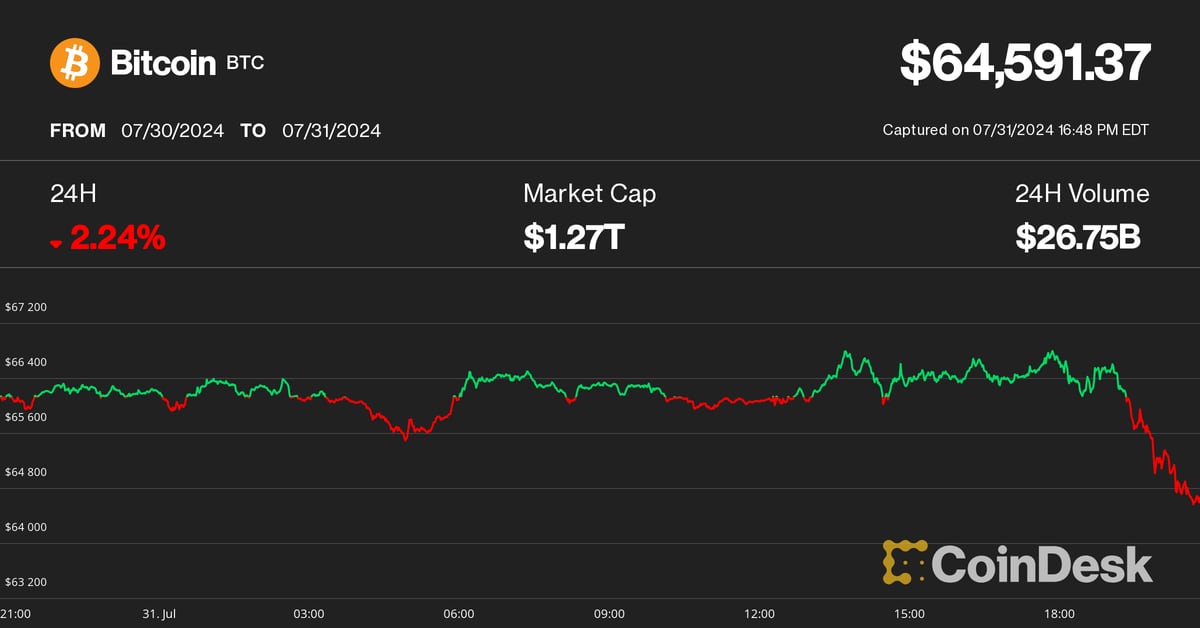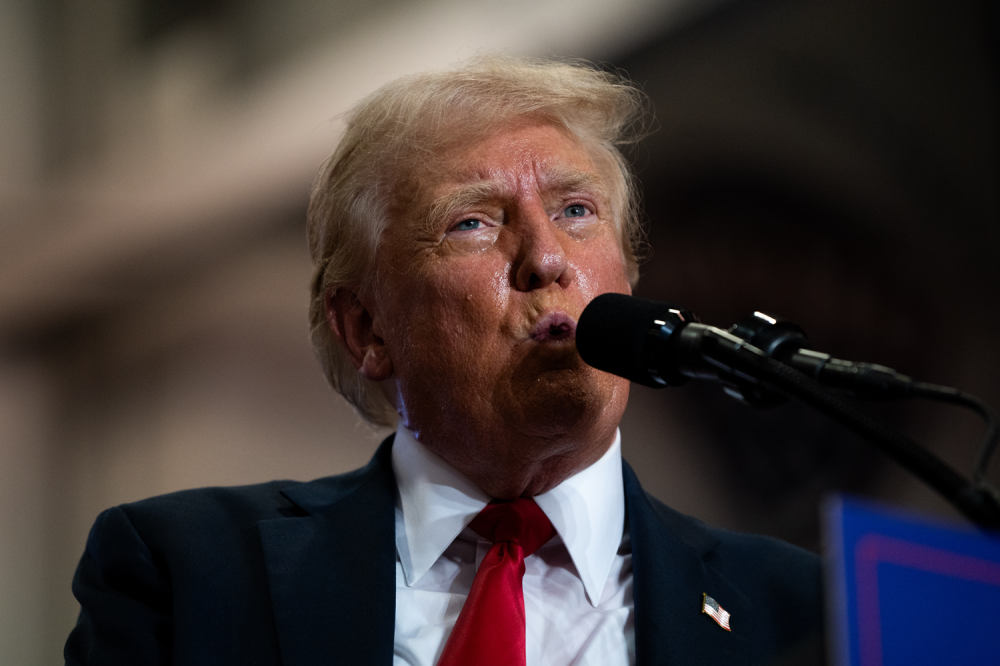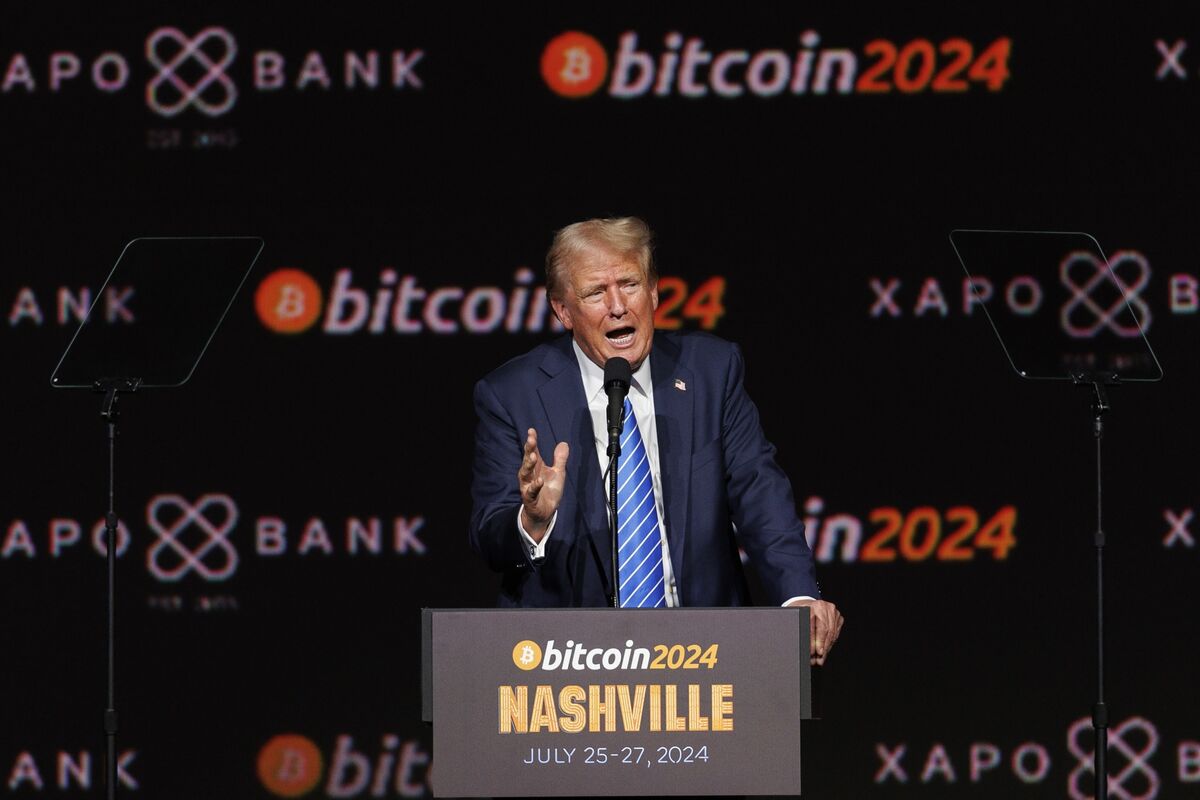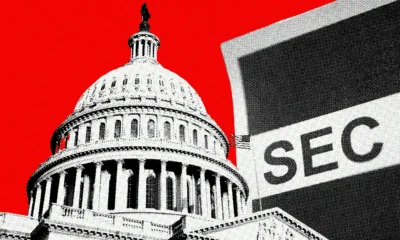Bitcoin
US House Prepares to Vote on First Standalone Crypto Market Structure Bill

The US House of Representatives is poised to vote in favor of a crypto market framework bill for the first time, in a symbolic effort to radically reshape the country’s digital asset regulatory landscape.
The Financial Innovation and Technology for the 21st Century Act, sponsored by members of the House Financial Services and Agriculture Committees, will begin voting on Wednesday afternoon, where it is expected to pass with a bipartisan majority.
The bill, called FIT21, would grant the U.S. Commodity Futures Trading Commission (CFTC) greater spot market authority over digital assets considered commodities, while also creating new jurisdictional lines for the Securities and Exchange Commission (SEC). ). Crypto companies and digital asset issuers would have a framework for determining whether and how their assets are securities as defined by the bill, which in turn would allow them to know who their primary regulator could be.
Rep. Patrick McHenry (RN.C.), who chairs the Financial Services Committee, told reporters on Tuesday that he expected “a substantial vote” in favor of the legislation to demonstrate that there is real momentum for digital asset legislation , a week after the Senate voted in favor of a House resolution that overturned SEC accounting guidance.
The bill is expected to pass, with a handful of Democrats joining a majority of Republicans in voting for the bill. The bill’s path through the Senate is less clear, and the White House said Wednesday it opposed the legislation, although President Joe Biden did not threaten to veto.
The bill has been the subject of much discussion in recent days.
Rep. Jim Himes (D-Conn.), one of the at least nine Democratic lawmakers who said they would support the bill said it “seems[ed] I look forward to working with my colleagues on the Financial Services Committee in our continued oversight of this issue.”
“FIT21 is an important step in regulating the cryptocurrency industry and a significant improvement on the status quo,” he said in a statement.
Rep. Ro Khanna (D-California) announced he would vote in favor of the project shortly before the vote on Wednesday, saying “we need blockchain innovation here in America.”
Rep. French Hill (R-Ark.) told reporters Tuesday that the bill creates a “5-step test for whether something is a decentralized blockchain or not” and includes a roadmap for the regulator to use.
In comments to the House Rules Committee, he said lawmakers who developed the bill engaged with regulators — including the SEC — for more than a year, incorporating their feedback into the legislation.
“We include provisions to mitigate conflicts of interest. We impose capital and other necessary requirements on intermediaries. And we impose higher standards of custody,” he said.
There is also an interim process where companies need to file a “notice of intent to register” with agencies, he said.
Opposition to the project, however, begins within the House Financial Services Committee itself.
Rep. Maxine Waters (D-Calif.), the committee’s ranking member, dubbed the bill a “law unfit for purpose” and told the House Rules Committee on Tuesday that “it is perhaps the worst and most harmful deregulation proposal that I’ve already done. we’ve seen for a long time”, comparing it to Commodity Futures Modernization Act. The CFMA, Waters charged, deregulated certain derivative products that later “exploded our economy when AIG collapsed.”
FIT21 does not give the CFTC greater authority to combat fraud or other crimes, despite directing the agency to oversee digital commodities, she said. The bill also eliminates disclosure requirements after 180 days, meaning the regulator cannot force companies it is supposed to regulate to provide audited financial statements after that deadline.
“What’s even more problematic is the bill’s definition of ‘investment contract assets,’” she said. “Securities that meet this definition would be transferred into a regulatory void, with no primary regulator and virtually no laws and regulations to speak of. Importantly, the investment contract asset definition is not limited to cryptography and it would be quite easy for both cryptographic and traditional securities to be formatted to meet this definition.”
A group of trade unions, consumer protection organizations, academics and others sent a public letter to House Speaker Michael Johnson (R-La.) and Minority Leader Hakeem Jeffries (DN.Y.), asking them to vote against the bill and offering a list of concerns similar to Gensler’s.
The letter took aim at the industry more broadly, saying that crypto “still struggles to demonstrate viable use cases outside of speculative investing” and referencing the several ongoing bankruptcies and civil and criminal litigation.
“The industry has recovered superficially this year, in part due to the controversial approval of spot BTC ETPs by the Securities and Exchange Commission,” the letter said. “However, the scams, hacks, theft, instability, reckless promotional activities and regulatory evasion that were present during the last crypto market remain endemic in the industry today.”
The letter was signed by organizations including the AFL-CIO, Americans for Financial Reform, Revolving Door Project, National Consumer Law Center and more than 30 others, as well as 10 individuals.
Echoing Gensler, the groups said they were concerned that the bill would weaken existing securities laws to the point where even non-crypto companies could “avoid stricter oversight” by linking to a decentralized network (or at least claiming which were linked to a decentralized network). network). While the bill gives the CFTC greater authority, the letter says that authority “is vague,” to the point that it could undermine other agencies like the Consumer Financial Protection Bureau.
“Overall, we believe that this bill, as drafted, introduces a political ‘cure’ that would be far worse than the disease and would create significant harm within and far beyond the crypto industry,” the letter read.
The bill’s supporters argue that legislation is needed to support companies’ efforts to “build a better financial services system and a better Internet.”
“Since the inception of the Bitcoin network in 2009, the blockchain and digital asset industry has existed without targeted market regulation,” a letter presented by the Blockchain Association, a lobby group, said. “The absence of clear rules creates confusion in the market for companies – and leaves users and consumers unprotected.”
The letter, signed by groups including stablecoin issuer Circle, Ethereum incubator ConsenSys, venture capital firm Digital Currency Group, exchanges such as Kraken and 50 other companies in the sector, further argued that a “lack of clarity” was running the risk of putting the US behind. in the “global technology race”.
SEC Chairman Gary Gensler published an affirmation on Wednesday opposing the legislation. In it, he raised the specter of crypto’s various meltdowns and scams, suggesting that the bill could allow even traditional pump and dumpers or penny stock dealers to escape oversight by branding themselves as users of decentralized networks.
“We should make the political choice to protect the investing public rather than facilitate the business models of non-compliant companies,” he said.
Bitcoin
Grayscale Unveils Bitcoin Mini Trust ETF

Bitcoin Currency
Grayscale Investments The Bitcoin Mini Trust began trading on Wednesday with a 0.15% expense ratio, offering a lower-cost option for bitcoin exposure in the market.
The Mini Trust, which has the symbol BTC and trades on NYSE Arca, is structured as a spin-off of the Grayscale Bitcoin Trust (GBTC). New shares will be distributed to existing GBTC shareholders with the fund contributing a portion of its bitcoin holdings to the new product. According to a company press releaseBTC’s S-1 registration statement became effective last week.
“The Grayscale team has believed in the transformative potential of Bitcoin since the initial launch of GBTC in 2013, and we are excited to launch the Grayscale Bitcoin Mini Trust to help further lower the barrier to entry for Bitcoin in an SEC-regulated investment vehicle,” said David LaValle, Senior Managing Director and Head of ETFs at Grayscale.
The Bitcoin Mini Trust’s debut comes amid growing interest in ETFs based on the current price of the two largest cryptocurrencies by market cap, bitcoin and ether. Spot bitcoin ETFs have generated nearly $18 billion in inflows since the first ones began trading on Jan. 11, though GBTC has lost nearly $19 billion in assets.
This fund differs from other funds because it is a conversion of an existing fund and has a 1.5% fee, the highest among spot bitcoin products that have received SEC approval this year.
Mini Bitcoin Trust Low Fee
On a Post X On Wednesday, Bloomberg senior ETF analyst Eric Balchunas noted the Bitcoin Mini Trust’s “lowest fee in the category…”
“[Important] to recognize how incredibly cheap 15bps is — about 10x cheaper than spot ETFs in other countries and other vehicles,” Balchunas wrote, adding that this pricing strategy reflects the competitive nature of the U.S. ETF market, which he referred to as the “ETF Terrordome.”
“This is what Terrordome does to fund [cost]. It reaches 1.5% [and] end in 0.15%, how to go from [a] country club to the jungle. But that’s why all the flows are here, investor paradise,” he noted.
Read more: Spot Bitcoin ETF Inflows Hit Daily High of Over $1 Billion
Bitcoin was recently trading at around $66,350, virtually flat since U.S. markets opened on Wednesday.


Grayscale also offers two spot Ethereum ETFs, the Grayscale Ethereum Trust (ETHE) and the Grayscale Ethereum (ETH) Mini Trustwhose performance is based on ETHE. ETHE outflows exceeded $1.8 billion in its first six days of trading, while ETH added more than $181 million in the same period, according to Farside. The remaining seven ETFs generated about $1.2 billion in inflows.
The story continues
Read more: Spot Ethereum ETFs Approved to Start Trading
Permanent link | © Copyright 2024 etf.com. All rights reserved
Bitcoin
Bitcoin (BTC) Price Drops Below $65K After FOMC as Middle East Tensions Rise

Cryptocurrencies fell sharply on Wednesday as rising geopolitical risks captivated investors’ attention following the conclusion of the Federal Reserve’s July meeting.
Bitcoin (BTC) fell to $64,500 from around $66,500, where it traded following Federal Reserve Chairman Jerome Powell’s press conference and is down more than 2% in the past 24 hours. Major altcoins including ether (ETH)sunbathing (SUN)Avalanche AVAX (AVAX) and Cardano (ADA) also fell, while Ripple’s XRP saved some of its early gains today. The broad cryptocurrency market benchmark CoinDesk 20 Index was 0.8% lower than 24 hours ago.
The liquidation happened when the New York Times reported that Iran’s leaders have ordered retaliation against Israel over the killing of Hamas leader Ismail Haniyeh in Tehran, raising the risk of a wider conflict in the region.
Earlier today, the Fed left benchmark interest rates unchanged and gave little indication that a widely expected rate cut in September is a given. The Fed’s Powell said that while no decision has been made on a September cut, the “broad sense is that we are getting closer” to cutting rates.
While digital assets suffered losses, most traditional asset classes rose higher during the day. U.S. 10-year bond yields fell 10 basis points, while gold rose 1.5% to $2,450, slightly below its record highs, and WTI crude oil prices rose 5%. Stocks also rallied during the day, with the tech-heavy Nasdaq 100 index rebounding 3% and the S&P 500 closing the session 2.2% higher, led by 12% gains in chipmaker giant Nvidia (NVDA).
The different performances across asset classes could be due to traders’ positioning ahead of the Fed meeting, Zach Pandl, head of research at Grayscale, said in an emailed note.
“Equities may have been slightly underutilized after the recent dip, while bitcoin is coming off a strong period with solid inflows, while gold has recovered after a period of weakness,” he said.
“Overall, the combination of Fed rate cuts, bipartisan focus on cryptocurrency policy issues, and the prospect of a second Trump administration that could advocate for a weaker U.S. dollar should be viewed as very positive for bitcoin,” he concluded.
UPDATE (July 31, 2024, 21:30 UTC): Adds grayscale comments.
Bitcoin
Donald Trump’s Cryptocurrency Enthusiasm Is Just Another Scam

Former US President Donald Trump spoke at the Libertarian National Convention in May and lent his a strong support to crypto: “I will also stop Joe Biden’s crusade to crush crypto. … I will ensure that the future of crypto and the future of bitcoin is made in the US, not taken overseas. I will support the right to self-custody. To the 50 million crypto holders in the country, I say this: With your vote, I will keep Elizabeth Warren and her henchmen out of your bitcoin.”
Former US President Donald Trump spoke at the Libertarian National Convention in May and lent his a strong support to crypto: “I will also stop Joe Biden’s crusade to crush crypto. … I will ensure that the future of crypto and the future of bitcoin is made in the US, not taken overseas. I will support the right to self-custody. To the 50 million crypto holders in the country, I say this: With your vote, I will keep Elizabeth Warren and her henchmen out of your bitcoin.”
Trump continued to court the cryptocurrency industry in the months that followed; he he appeared at the Bitcoin 2024 Conference in Nashville this week, along with independent presidential candidate Robert F. Kennedy Jr.’s parting words to Trump — “Have fun with your bitcoin, your cryptocurrency and whatever else you’re playing with” — were less than enthusiastic, but the industry itself remains packed with ardent Trump supporters.
This turnaround came as a surprise, given Trump’s previous strong opposition to cryptocurrency. When Facebook was floating its Libra cryptocurrency in 2019, Trump tweeted: “I am not a fan of Bitcoin and other cryptocurrencies, which are not money, and whose value is highly volatile and based on thin air.” Former national security adviser John Bolton’s White House memoir, The Room Where It Happened, quotes Trump as telling Treasury Secretary Steven Mnuchin: “Don’t be a trade negotiator. Go after Bitcoin.” [for fraud].” In 2021, Trump counted Fox Business that bitcoin “just looks like a scam. … I want the dollar to be the world’s currency.”
Why the change? There doesn’t seem to be any crypto votes. Trump’s “50 million” number comes from a poorly sampled push survey by cryptocurrency exchange Coinbase which claimed 52 million cryptocurrency users in the United States starting in February 2023. But one survey A survey conducted last October by the US Federal Reserve showed that only 7% of adults (about 18.3 million people) admitted to owning or using cryptocurrencies — down from 10% in 2022 and 12% in 2021. Many of these people are likely wallet owners who were left holding the bag after crypto plunged in 2022 — and are not necessarily new fans.
What Trump wants from the cryptocurrency industry is money. The cryptocurrency industry has already raised more than US$ 180 million to run in the 2024 US elections through his super PACs Fairshake, Defend American Jobs and Protect Progress.
Fairshake spent $10 million on taking Rep. Katie Porter in the primary battle for Dianne Feinstein’s California Senate seat by funding Porter’s pro-crypto rival Adam Schiff. This put $2 million to knock out Rep. Jamaal Bowman in the Democratic primary for New York’s 16th District in favor of pro-crypto George Latimer. In the Utah Senate Republican primary, Rep. John Curtis defeated Trent Staggs with the help of $4.7 million from Defend American Jobs. In Alabama’s House District 2, the majority of campaign expenses came from the cryptocurrency industry.
Fairshake is substantially financed by Coinbase, cryptocurrency issuer Ripple Labs, and Silicon Valley venture capital firm Andreessen Horowitz, or a16z. Silicon Valley was awash in cryptocurrencies during the 2021 bubble, and a16z in particular continues to promote blockchain startups to this day — and still holds a huge amount of bubble crypto tokens that he wishes he could cash in on.
Many in Silicon Valley would like an authoritarian who they think will let them run wild with money — while bailing them out in tough times. Indeed, Trump promised Bitcoin 2024 participants that he hold all bitcoins that the United States acquires. (Never mind that it is usually acquired as the proceeds of crime.) Silicon Valley explicitly sees regulation of any kind as its greatest enemy. Three a16z manifestos — “Politics and the Future” It is “The Techno-Optimist Manifesto” and 2024 “The Small Tech Agenda—describe co-founders Marc Andreessen and Ben Horowitz’s demands for a technology-powered capitalism unhindered by regulation or social considerations. They name “experts,” “bureaucracy,” and “social responsibility” as their “enemies.” Their 2024 statement alleges that banks are unfairly cutting off startups from the banking system; these would be crypto companies funded by a16z.
Trump’s vice presidential pick, Senator J.D. Vance, is a former Silicon Valley venture capitalist. He was once employed by Peter Thiel, who bankrolled Vance’s successful 2022 Senate run; Vance has been described as a “Thiel creation”. He has increased support for the Trump ticket among his venture capital associates. Vance is a bitcoin holder and a frequent advocate of encryption. He recently released a draft bill to review how the Securities and Exchange Commission (SEC) and the Commodity Futures Trading Commission (CFTC) control crypto assets. In 2023, he circulated a bill to prevent banks from cutting out cryptocurrency exchanges.
Minimal regulation has been tried before. It led to the wild exuberance of the 1920s, which ended with the Black Tuesday crash of 1929 and the Great Depression of the 1930s. Regulators like the SEC were put in place during this era to protect investors and transform the securities market from a jungle into a well-tended garden, leading to many prosperous and stable decades that followed.
Crypto provides the opposite of a stable and functional system; it is a practical example of how a lack of regulation allows opportunists and scammers to cause large-scale disasters. The 2022 Crypto Crash repeated the 2008 financial crisis in miniature. FTX’s Sam Bankman-Fried was feted as a financial prodigy who would perform economic miracles if you just gave him carte blanche; he ended up stealing billions of dollars of customers’ money, destroying the lives of ordinary people, and is now in a prison cell.
U.S. regulators have long been concerned about the prospect of cryptocurrency contagion to the broader economy. Criminal money laundering is rampant in cryptocurrency; even the Trump administration has made rules in December 2020 to reduce the risk of money laundering from crypto. Meanwhile, the crypto industry has persistently tried to infiltrate systemically risky corners of the economy, such as pension funds.
Four U.S. banks collapsed during the 2023 banking crisis, the first since 2020. Two of them, Silvergate Bank and Signature Bank, were deeply embedded in the crypto world — Silvergate in particular appears to have collapsed directly from its heavy reliance on FTX and failed a few months after that. Silicon Valley Bank was not involved in crypto but collapsed due to a run on the bench due to panic among venture capital deposit holders, particularly Thiel’s Founders Fund.
Project 2025the Heritage Foundation mammoth conservative wish list The plan, which Trump and Vance have both endorsed and tried to distance themselves from at various times, emphasizes the importance of party loyalists, noting especially financial regulation. The plan recommends replacing as much of the federal bureaucracy as possible with loyalists and “trusted” career officials rather than nonpartisan “experts.” Vance defended in 2021 that Trump should “fire every mid-level bureaucrat, every civil servant in the administrative state” and “replace them with our people.” Loyalty will likely trump competence.
Crypto is barely mentioned directly in Project 2025 — suggesting it has little active support among the broader conservative coalition. But near the end of the manifesto is a plan to dismantle most U.S. financial regulations and investor protections put in place since the 1930s, suggesting the exemption the crypto industry seeks from current SEC and CFTC regulations.
Bitcoin, the first cryptocurrency, started as an ideological project to promote a strange variant of Murray Rothbard’s anarcho-capitalism and the Austrian gold-backed economy—the kind we abandoned to escape the Great Depression. Crypto quickly co-opted the “end of the Fed” and “establishment elites” conspiracy theories of the John Birch Society and Eustace Mullins. It’s a way for billionaire capitalists like Thiel, Andreessen and Elon Musk to claim they’re not part of the so-called elite.
If a second Trump administration were to limp along with financial regulators and allow cryptocurrencies to have free rein, it could help foster the collapse of the U.S. economy that bitcoin claimed to prevent. But Trump is more likely to be happy to take the crypto money and run.
Bitcoin
Trump’s Bitcoin (BTC) Reserve Plan Seen as Just a ‘Small Token Stash’

Donald Trump’s recent promise to create a “strategic national stockpile of Bitcoin” may not turn out to be as big a commitment as the hype surrounding the announcement makes it seem.
“Trump’s proposal is extremely modest,” said George Selgin, director emeritus of the Center for Monetary and Financial Alternatives at the Cato Institutea Washington-based public policy group. “It doesn’t have much economic implication.”
-

 Ethereum12 months ago
Ethereum12 months agoEthereum Posts First Consecutive Monthly Losses Since August 2023 on New ETFs
-

 Regulation12 months ago
Regulation12 months agoCryptocurrency Regulation in Slovenia 2024
-

 News12 months ago
News12 months agoNew bill pushes Department of Veterans Affairs to examine how blockchain can improve its work
-

 Regulation12 months ago
Regulation12 months agoThink You Own Your Crypto? New UK Law Would Ensure It – DL News
-

 Regulation12 months ago
Regulation12 months agoUpbit, Coinone, Bithumb Face New Fees Under South Korea’s Cryptocurrency Law
-

 Regulation12 months ago
Regulation12 months agoA Blank Slate for Cryptocurrencies: Kamala Harris’ Regulatory Opportunity
-

 Regulation12 months ago
Regulation12 months agoBahamas Passes Cryptocurrency Bill Designed to Prevent FTX, Terra Disasters
-

 Regulation12 months ago
Regulation12 months agoIndia to Follow G20 Policy for Cryptocurrency Regulation: MoS Finance
-

 News1 year ago
News1 year ago“Captain Tsubasa – RIVALS” launches on Oasys Blockchain
-

 Ethereum1 year ago
Ethereum1 year agoComment deux frères auraient dérobé 25 millions de dollars lors d’un braquage d’Ethereum de 12 secondes • The Register
-

 News12 months ago
News12 months agoEU supports 15 startups to fight online disinformation with blockchain
-

 News1 year ago
News1 year agoSolana ranks the fastest blockchain in the world, surpassing Ethereum, Polygon ⋆ ZyCrypto

















